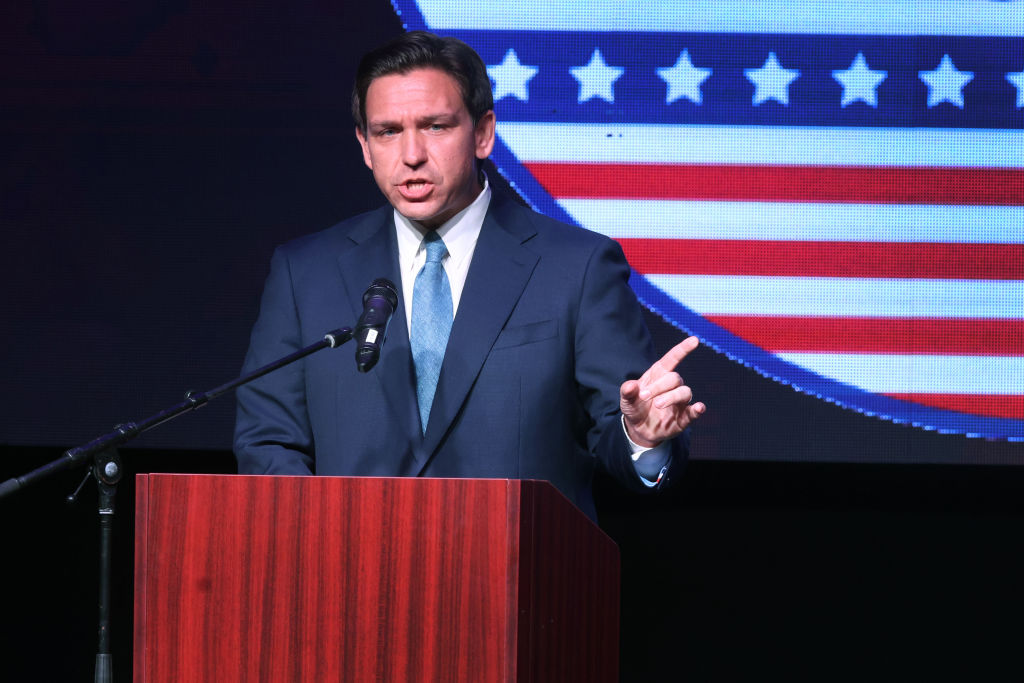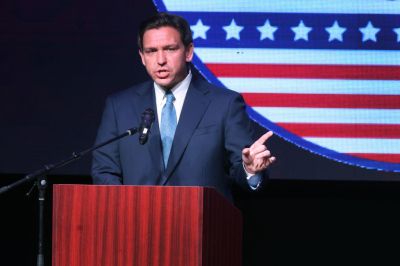Ron DeSantis has largely maintained support for his expected 2024 bid from wealthy Republican donors despite some bad headlines in recent weeks. Yet the Florida governor risks raising less money in the near future as party financiers weigh his viability as a challenger to Donald Trump.
The Florida governor’s sagging presidential poll numbers, and Trump’s increasingly commanding lead, have led to countless stories about the Florida governor’s evaporating support from major Republican benefactors. Donors and consultants connected to them tell The Dispatch those reports are “overblown”—though they acknowledge that some are scaling back contributions or hitting pause on more giving.
“I’ve not heard someone who's a DeSantis guy saying: ‘I’m leaving.’ But I have seen some who are thinking about him having second thoughts,” said Eric Levine, an attorney and Republican donor in New York who opposes Trump but has not picked an alternative contender. He added that while the governor is still “very viable,” some donors “are just really curious about his strategy.”
For many DeSantis doubters, the fundamental question is whether he can take on Trump. And they’re comfortable waiting until the governor jumps into the race before deciding whether he’s a good investment.
“People are anxious to see if DeSantis can perform once he is a candidate,” added a veteran Republican consultant who is in regular contact with the party’s wealthy donors and requested anonymity to speak candidly. “There doesn’t seem to be the, rushing to his side, in the way there was two months ago.”
DeSantis raised roughly $200 million for his 2022 reelection bid. After spending around half of that on his way to a landslide victory, the governor had nearly $100 million left. While money for a state race can’t be used for a federal contest, DeSantis can transfer the leftover cash to Never Back Down, the designated super PAC supporting his presidential campaign. Never Back Down is taking charge of the DeSantis voter turnout operation, among other priorities.
DeSantis clearly has some skill raising resources from party insiders who write big checks and bundle cash from well-heeled contributors. But running statewide in Florida is different than running against Trump, and many donors grew concerned in the months after the midterm elections. They have watched withering attacks from Trump undermine the governor’s support with grassroots conservatives, judged his response insufficient at best, and developed broad concerns that he is not equipped to beat the former president.
Stories detailing DeSantis’ grating personal style and a sometimes acrimonious relationship with donors and other well-connected Republicans—the kind whose support is useful in presidential campaigns—have been ubiquitous as reporters descend on Tallahassee. This narrative of DeSantis as a prickly, unlikable candidate has certainly taken hold among some of the party’s coveted financiers.
Policy differences persist too. Many benefactors liked DeSantis despite, not because of, his cultural populism. While many still prefer DeSantis over Trump, the 44-year-old governor hasn’t helped his standing with donors by sparring with Disney or signing a state law outlawing abortion after six weeks (with some exceptions for rape, incest, and the mother’s health).
“There really is a strong centrist segment of the Republican Party and the country,” said Bobbie Kilberg, a Republican donor from the Washington suburb of McLean, Virginia. “I don’t think those people view DeSantis as a very appealing alternative.” Kilberg recently had lunch with former New Jersey Gov. Chris Christie, who is mulling a White House run.
Most Republican campaign contributors who had already informed the governor or his political representatives that he could count on them for financial backing in the Republican primary are largely delivering on their support. But that does not mean donors aren’t hedging, explained Ron Gidwitz, a businessman and veteran Republican financier based in Chicago.
Gidwitz said some donors might have reduced the size of their planned initial donation—to DeSantis’ presumed campaign or Never Back Down—without saying so. It’s also possible some donors contributed before Trump’s poll numbers spiked this spring, and now they’re privately reconsidering whether to write a “second check” until after the first televised primary debate.
But these kinds of reservations aren’t the same as going with, or attempting to recruit, a different candidate to take on Trump. This gives DeSantis another shot to establish himself as the Trump challenger. “I think it will be later in the year before people start to open their wallets in a fulsome way.” a veteran Republican operative said.
“This race is long. Most people aren’t committing huge amounts of money with one check written today. It’s some money now, and some money in the future. Let’s see how this goes,” Gidwitz explained. Maybe “it’s the second check that doesn’t show up. It’s not the first.”
Although donors are prone to lament that Republicans like Texas Gov. Greg Abbott, Georgia Gov. Brian Kemp, and Virginia Gov. Glenn Youngkin appear to be taking a pass on 2024, sources say there is little discussion among GOP financiers about trying to goad them into the race. DeSantis isn’t taking anything for granted, making a comprehensive effort to forge relationships with GOP moneymen that has been missing from his political operation until now. Beginning last week, and continuing this week, DeSantis is hosting dinners with donors at the governor’s mansion in Tallahassee.
DeSantis’ political team and Never Back Down both declined to comment for this story.
According to a Republican donor privy to the discussion at one such dinner, the governor pitched donors on his general election strength compared to Trump. DeSantis emphasized his familial roots in Ohio and Pennsylvania, the latter an important battleground state. He also made the case that the former president will not do any better there or in Arizona and Georgia, two swing states he lost in 2020 that had previously voted Republican in White House contests for a generation.
Bill Stern, a businessman and Republican donor in South Carolina who supported Trump in 2016 but recently committed to DeSantis, said that he has not seen a drop-off in support for the governor in his circle of party insiders. Nor is he worried, pointing out that DeSantis isn’t even a candidate yet.
“People that liked DeSantis early on still like DeSantis,” Stern said. “Until the governor announces and is in the race and gets out there and starts campaigning, you can’t judge. The donors I deal with across the country that were drawn to Ron DeSantis—they’re still with him.”
Michael Warren contributed to this report.







Please note that we at The Dispatch hold ourselves, our work, and our commenters to a higher standard than other places on the internet. We welcome comments that foster genuine debate or discussion—including comments critical of us or our work—but responses that include ad hominem attacks on fellow Dispatch members or are intended to stoke fear and anger may be moderated.
With your membership, you only have the ability to comment on The Morning Dispatch articles. Consider upgrading to join the conversation everywhere.